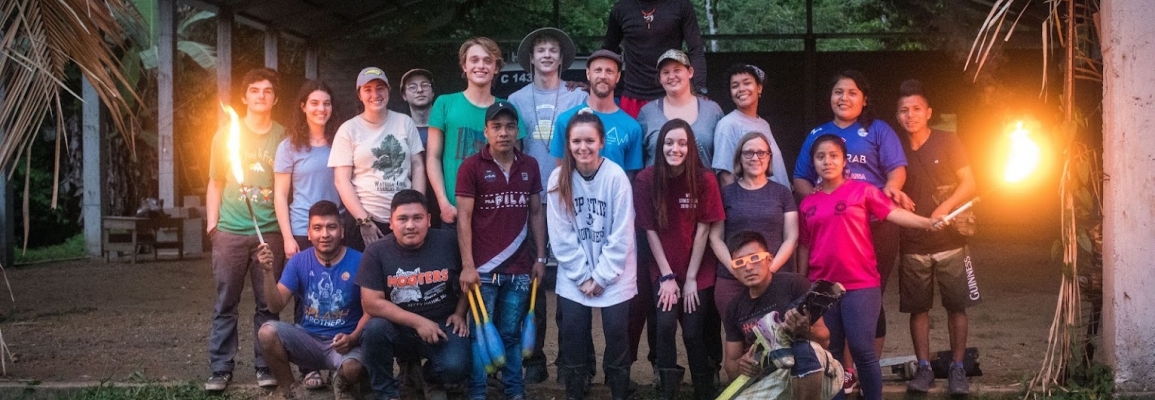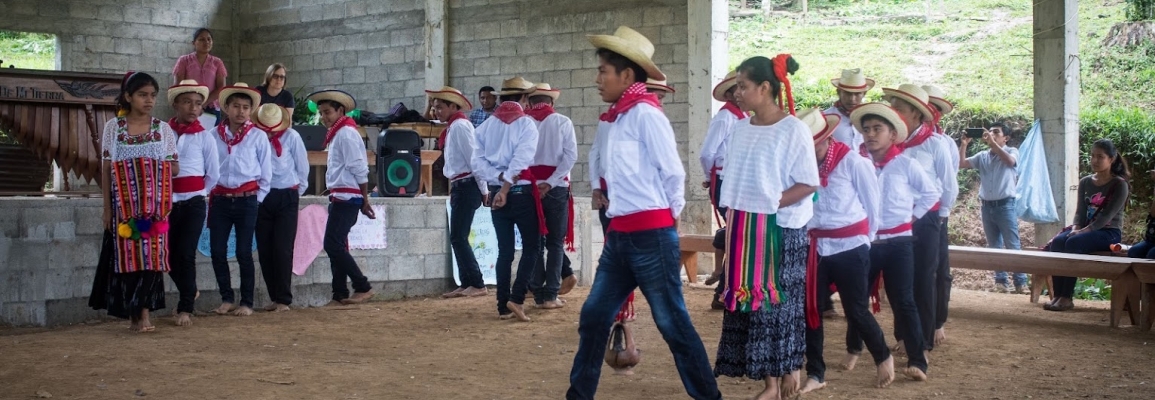Program Dates: June 2, 2024 - June 13, 2024
Interested in human rights, education, climate change, and/or indigenous studies?
Then join this 11-day study abroad to Guatemala in June! We will learn about contemporary Maya culture through homestays with indigenous families, volunteer alongside local middle school students in their school gardens, and participate in community conversations around climate change. Our sister community, Copal AA La Esperanza, is a vibrant indigenous Maya community in the highlands of Guatemala, formed during the last year of the Guatemalan Genocide. The residents have spent the last 20 years rebuilding their lives, caring for their people and their place, and advocating for positive change for Guatemala’s indigenous communities. Come continue your journey as an advocate for social justice and experience a powerful example of how one community is using education to promote equity and dignity in human relations and sustainability for the planet. Spanish language skills are helpful, but not required. Satisfies Honors Junior Seminar and International Experience requirements.
Locations
Guatemala is a country in Central America. Guatemala is bordered to the north and west by Mexico; to the northeast by Belize and the Caribbean; to the east by Honduras; to the southeast by El Salvador and to the south by the Pacific Ocean, respectively. With an estimated population of around 17.6 million, it is the most populous country in Central America and is the 11th most populous country in the Americas.
The core of the Maya civilization, which extended across Mesoamerica, was historically based in the territory of modern Guatemala. In the 16th century, most of this area was conquered by the Spanish. Guatemala attained independence in 1821 from Spain and Mexico. In 1823 Guatemala became part of the Federal Republic of Central America, which dissolved by 1841.
From the mid- to late 19th century, Guatemala suffered chronic instability and civil strife. Beginning in the early 20th century, it was ruled by a series of dictators backed by the United Fruit Company and the United States government. In 1944, the authoritarian leader Jorge Ubico was overthrown by a pro-democratic military coup, initiating a decade-long revolution that led to sweeping social and economic reforms. A U.S.-backed military coup in 1954 ended the revolution and installed a dictatorship.
From 1960 to 1996, Guatemala endured a bloody civil war fought between the US-backed government and leftist rebels, including genocidal massacres of the Maya population perpetrated by the military.Since a United Nations–negotiated peace accord, Guatemala has achieved both economic growth and successful democratic elections, although poverty, crime, drug trafficking and civil instability remain major issues. Although Guatemala is rich in export goods, around a quarter of the population lived in precarious conditions as of 2022. The food crisis resulting from the Russian invasion of Ukraine had added another 700,000 people to the number. (Source: Wikipedia)
Academics
Program participants will be enrolled in the same course but can choose between HON and CI credit.
Course Prefix | Course Name | Credits | Instructor |
HON 3515 | Sustainability & Education in Indigenous Guatemala | 3 | Greg McClure |
CI 3536 | Sustainability & Education in Indigenous Guatemala | 3 | Greg McClure & Chris Van Loan |
Faculty Leaders
Dr. Greg McClure
Professor of Elementary Education
Department of Curriculum and Instruction, Elementary Education Program
mccluregs@appstate.edu
Dr. Greg McClure is a Professor in the Department of Curriculum and Instruction at Appalachian State University. His teaching and research interests focus on the ways language, culture, and power intersect to influence teaching and learning. Greg teaches courses that prepare teachers for working with linguistically and culturally diverse learners. Prior to coming to ASU, Greg worked as an ESL teacher and program director in North Carolina public schools. He earned his Ph.D. in Language and Literacy Education at the University of Georgia.
Dr. Christopher Van Loan
Professor of Elementary Education
Department of Child Development, Literacy, and Special Education
vanloancl@appstate.edu
Dr. Christopher L. Van Loan is a professor in the special education program at Appalachian State University. Dr. Van Loan teaches graduate and undergraduate courses in emotional and behavioral disorders, classroom management, and positive behavioral supports. He also served in the Peace Corps in Guatemala for two years.
Program Cost: $2,735
Program cost includes airfare, meals, lodging, and in-country transportation.
Please note - Students are responsible for the total program cost upon submitting the application and deposit. Refunds are contingent upon meeting the minimum enrollment of the program. If a student decides to withdraw before departure, that student may be eligible for a refund if the program has met the minimum enrollment and is therefore viable.
Non-billable costs are estimates only and will be affected by personal spending habits, currency fluctuations, etc. Prices listed in USD unless otherwise noted. Students are encouraged to start planning for their study abroad program costs well in advance.
Payment Schedule | Amount | Dates |
Deposit | $300 | Upon receipt of application |
Remaining balance due | $2,435 | 3/19/2024 |
Estimated Additional Expenses | |
Undergraduate Tuition - Resident | $152.54 / credit hour |
Undergraduate Tuition - Non-Resident | $172.54 / credit hour |
Passport | $150 |
Appalachian reserves the right to cancel or alter the program format or to change costs in case of conditions beyond the university's control. Further details about Appalachian's withdrawal/cancellation policy can be found at this link.
Application Process
- In order to apply for this program, you will need to contact one of the program leaders and provide your Banner ID and email address. Program leaders may request additional information or a meeting to discuss the details of the program and your interest.
- When permission to apply for the program is granted, you will receive an email from your program leader with instructions to apply.
- Apply to the program following the instructions from the program leader.
- Print, sign and drop off your application at the Office of International Education and Development at Plemmons Student Union (PSU), Suite 321 ( 3rd floor), 263 Locust Street Boone, NC 28608. Your application will be considered complete when you have submitted your digital application, paid the $300 deposit, and dropped off your printed and signed application. The fee cannot be paid until it appears on your student account. Please note that it may take 2–3 business days for it to post to your account. You will receive an email with Instructions for paying the deposit fee. Instructions can also be found in the application.

